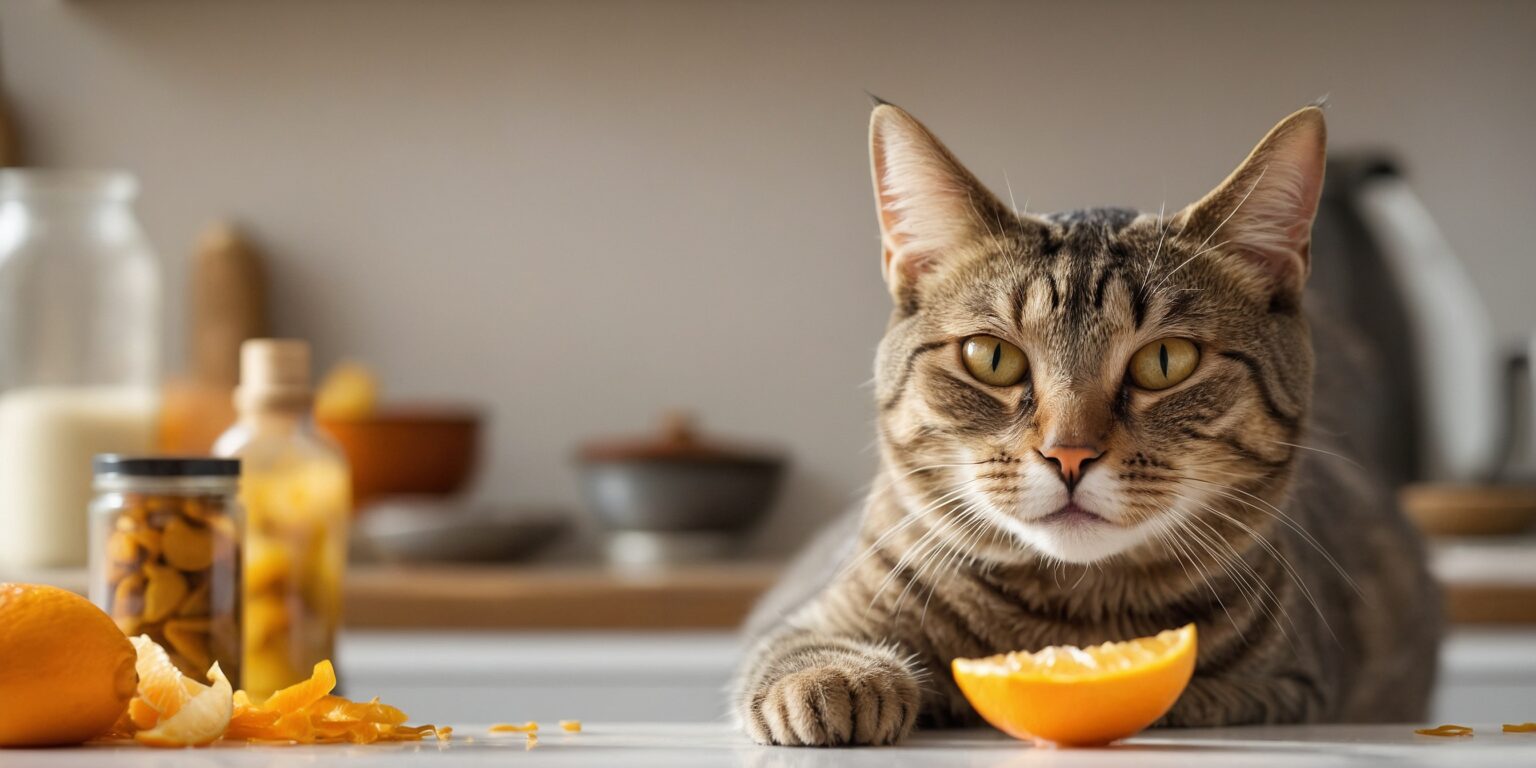Ever seen your cat sniff, then stand there with mouth slightly open, as if pulling a funny face? That’s the flehmen response. It’s her high-tech way of “tasting” a scent that intrigues her… or one she’d rather avoid.
- A cat’s nose, simply explained
- Why do some smells put cats off?
- Smells cats hate (and how to use them kindly)
- Dirty litter box
- Citrus (lemon, orange, grapefruit)
- Pungent spices (pepper, mustard, curry)
- Certain aromatic plants
- Banana
- Cleaning products (bleach, solvents)
- Rancid or spoiled fish
- Coffee
- Vinegar
- Perfumes, deodorants and scented soaps
- Smell of other animals
- Use scent aversions without stressing your cat
- FAQ
A cat’s nose, simply explained
Your feline’s nose catches layers of smells we barely notice. Alongside the nose, the vomeronasal organ (Jacobson’s organ) in the palate decodes special scent molecules with amazing finesse.
What feels mild to us can be overwhelming to her. Curious about pleasant smells on the flip side? Explore the smells cats love to keep your home calm and cozy.
Why do some smells put cats off?
- Too intense: strong perfumes or sharp odors can feel like a punch to a sensitive nose.
- Warning signals: certain scents resemble those of irritating plants or harsh chemicals, so cats instinctively avoid them.
- Cleanliness cues: rancid, rotten or soiled smells say “not safe” to many felines.
Smells cats hate (and how to use them kindly)
Dirty litter box
A saturated tray (urine, stools) becomes a big no-no. Some cats end up boycotting the box altogether.
- Practical tip: sprinkle a very thin layer of baking soda under the litter to help neutralize odors; increase gradually if she accepts it.
- Avoid heavily scented litters: they mask smells but can overwhelm sensitive noses.
- Choosing a setup from scratch? See the best litter for your cat based on your home and habits.
Citrus (lemon, orange, grapefruit)
Bright citrus scents often repel cats. Used sparingly, they can protect a surface without spraying anything on your cat.
- Place dried peels or zest in a small lidded jar with pinholes near plants or shelves; refresh weekly.
- Never apply citrus on your cat’s coat or paws, and avoid undiluted essential oils.
Pungent spices (pepper, mustard, curry)
To a feline, these are intense and irritating. They’re not toys and not safe repellents to scatter.
- Skip sprinkling spices altogether: it can irritate eyes, nose and cause stress.
Certain aromatic plants
Eucalyptus, geranium and even strong lavender can put cats off. Sometimes the scent alone keeps them away.
- Keep such plants out of reach and always check plants dangerous for cats before bringing new greenery home.
Banana
Odd but true: many cats back away from banana scent. Others barely notice it.
- Anti-jump hack: rub the inside of a banana peel on a clean counter, then wipe. The faint residual smell can deter curious paws.
Cleaning products (bleach, solvents)
Strong chemical odors are uncomfortable for cats. And there’s a classic trap to avoid…
- Common mistake: cleaning cat urine with bleach. Its smell can actually attract some cats to re-mark. Learn why bleach attracts cats and what to do instead.
- Use an enzymatic cleaner, or diluted white vinegar followed by a thorough rinse on compatible surfaces. If accidents repeat, see why cats pee outside the litter box for root causes.
Rancid or spoiled fish
Fishy dinner? Lovely. Fish gone bad? Big nope. That’s your cat’s safety radar working.
- Discard any questionable food right away—better safe than sorry.
Coffee
Fresh grounds smell powerful and can deter some cats. But don’t scatter them outside.
- Avoid using coffee grounds in the garden: ingestion is risky, and the mess is real.
Vinegar
Many cats dislike its sharp, acidic note. Handy for cleaning—used with care.
- Spot-test first, dilute, rinse well, and air the room to keep whiskers happy.
Perfumes, deodorants and scented soaps
Bold synthetic fragrances can confuse or stress a cat. Perfuming your kitty? Hard pass.
- Choose gentle, unscented products if you must bathe her, and rinse thoroughly.
Smell of other animals
More than the smell itself, sudden “intruder vibes” can be stressful. Slow and steady wins.
- Do scent swapping gradually with a cloth before any face-to-face introduction.
Use scent aversions without stressing your cat
- Soft scent fences: prefer contained citrus peels (in jars or sachets) over direct sprays.
- Calm refuge: keep a quiet area free of strong odors—with fresh water, comfy bedding and a spotless litter box.
- Go slow: introduce any new smell in stages, watching your cat’s body language for “too much.”
- Original pro tip: moving a beloved item (cat tree, bed)? Create a “scent path.” Rub a cloth on her favorite nap spot, place it halfway to the new location, and shift it closer daily. That familiar trail gently leads her to the change.
A tiny, delightful fact
When your cat sniffs, then makes that quirky face, she’s not judging your cleaning. She’s channeling air to Jacobson’s organ—like running a mini lab behind her whiskers.
FAQ
What smells do cats hate the most?
Common turn-offs include citrus, strong cleaning products (like bleach), pungent spices, vinegar, coffee, some aromatic plants, and a dirty litter box.
Are citrus scents dangerous for cats?
The smell alone can deter. Never put citrus oils or peels on your cat, avoid undiluted essential oils, and keep all products out of reach.
How should I clean cat urine without attracting re-marking?
Blot first, then use an enzymatic cleaner or diluted white vinegar, rinse well and dry. Avoid bleach, which can encourage repeat marking.
How can I reduce litter odors every day?
Scoop clumps and stools daily, wash the tray regularly, change litter per its type, and try a thin baking soda layer under the litter if tolerated.







